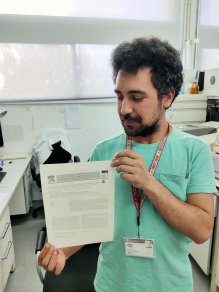New Publication: Processing factors that affect the balance of alcohols and alkyl esters during ‘Arbequina’ olive oil production: separation and clarification steps
Boudebouz, A., Romero, A., Hermoso, J.F., Boqué, R., and Mestres, M.
LWT - Food Science and Technology, 149, p.111842. (2021)
doi.org/10.1016/j.lwt.2021.111842
Link Accés lliure/Link Acceso libre/Free access link
The aim of this study was to assess how different conditions used on the centrifugation step during olive oil extraction affect its quality by considering the balance of fatty acid alkyl esters (FAAEs) and their precursor alcohols. All the experiments were carried out under real working conditions in a two-phase decanter followed by a vertical centrifuge (VC) and different water injection doses and paste injection rates were tested. The fruits used were from 'Arbequina' variety at two different maturity stages and the balances of alcohols and FAAEs were measured at the outlets of both, decanter and VC, with respect to the system inlet.
Results show that the paste injection rate affects the content of alcohols and FAAEs in the final oil, which tend to increase when working closer to the maximum capacity of the decanter. Different behaviors have been detected when dealing with unripe or ripe fruits. Similarly, the water addition doses have different effects on the FAAEs and alcohols formation depending on the maturity status. Therefore, both the decanter and the step decanter to vertical centrifuge are key points that, when properly controlled, allow minimizing FAAEs formation, which is essential for obtaining quality oils.

